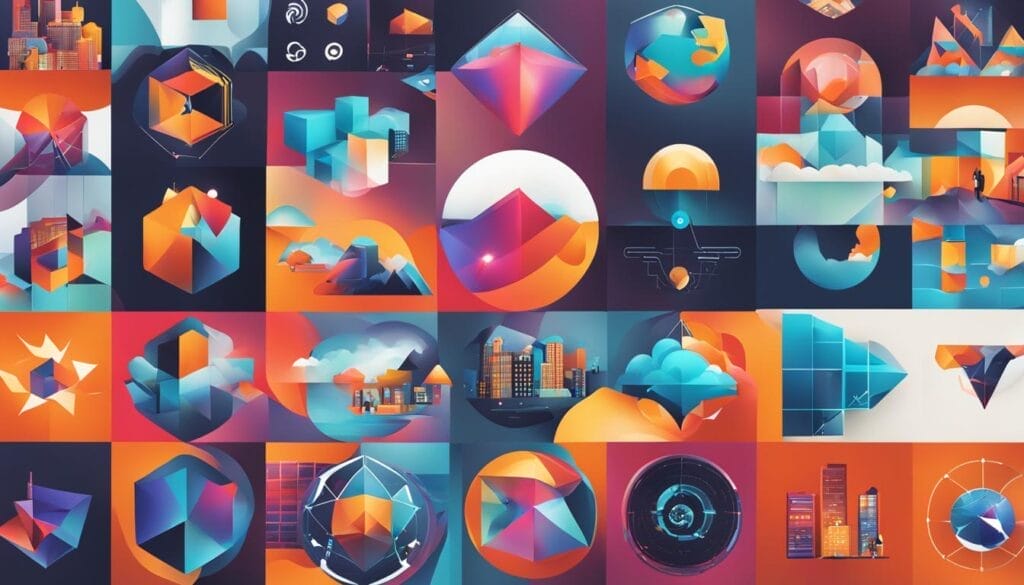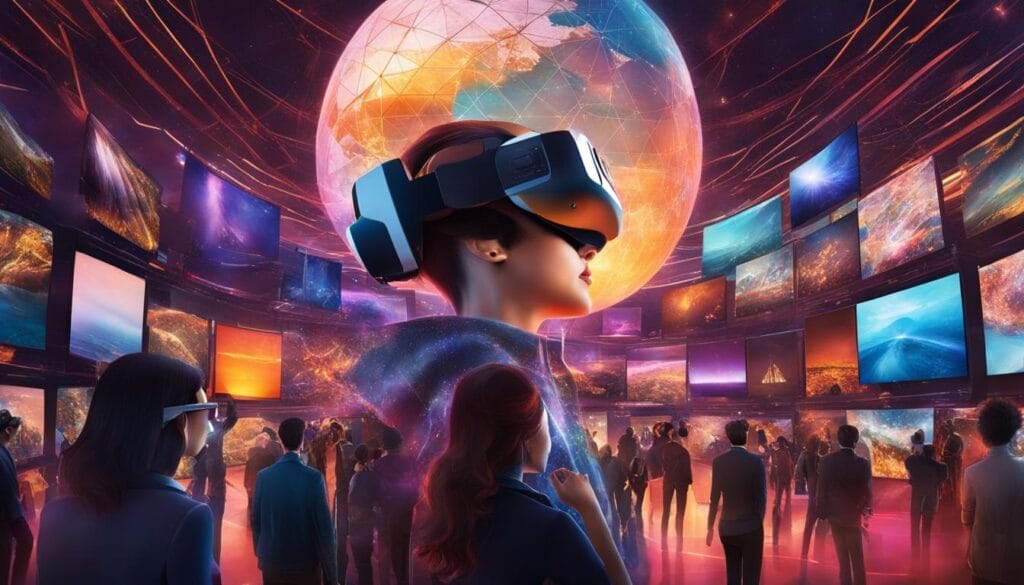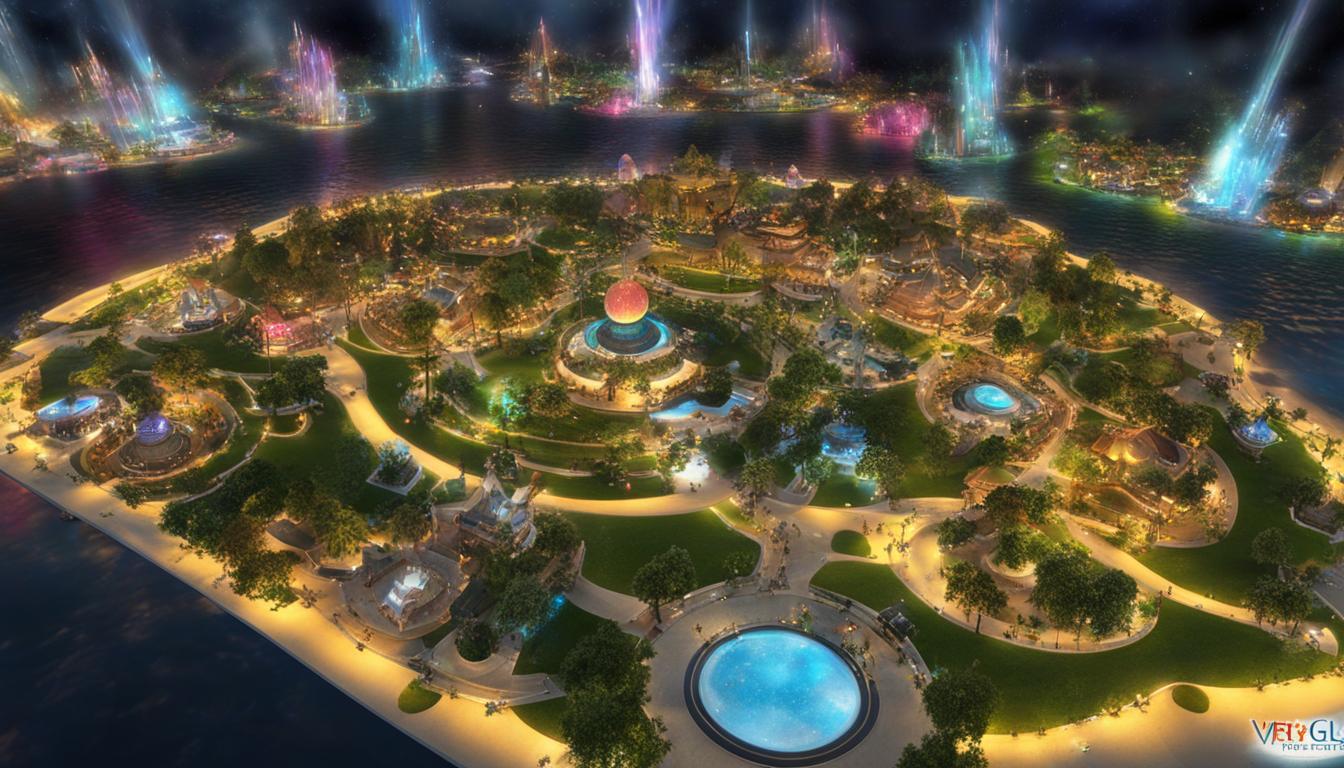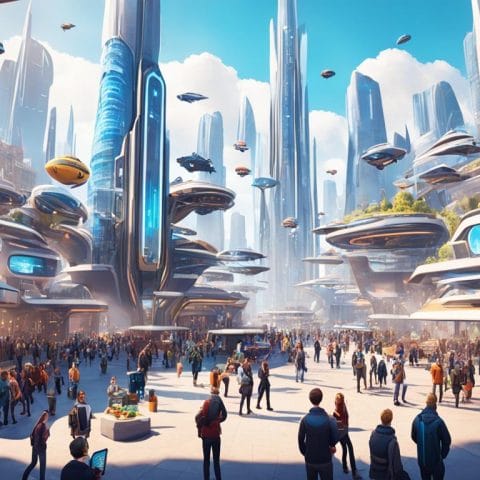As the metaverse continues to gain traction, global metaverse events, virtual reality events, and metaverse conferences are becoming increasingly prevalent. The metaverse, a virtual world that combines augmented and virtual reality with physical reality, has captured the attention of tech giants like Microsoft, Meta, Epic Games, and Nvidia. This emerging trend is projected to grow in 2023 and beyond, with Forbes naming it one of the top ten trends to watch. The metaverse offers endless possibilities and is expected to drive significant investment, with spending on foundation technologies like VR/AR projected to rise from $12 billion in 2020 to $72.8 billion in 2024.
Key Takeaways:
- The metaverse is a new virtual world that combines augmented and virtual reality with the physical reality.
- Tech giants like Microsoft, Meta, Epic Games, and Nvidia are heavily invested in the development and growth of the metaverse.
- Forbes has named the metaverse one of the top ten trends to watch for in the coming years.
- Spending on foundation technologies of the metaverse, such as VR/AR, is projected to rise from $12 billion in 2020 to $72.8 billion in 2024.
- Industries like gaming, retail, art, healthcare, and blockchain are positioning themselves as key players in the metaverse ecosystem.
What is the Metaverse?
The metaverse is a revolutionary virtual world that combines the elements of virtual reality (VR), augmented reality (AR), and online gaming to create a seamless and immersive digital experience. Unlike traditional video games, the metaverse is not confined by specific rules or goals, allowing users the freedom to explore, create, and interact with others in a dynamic and interactive environment.
By leveraging advanced technologies, the metaverse offers a unique blend of real-world and digital experiences. Users can navigate through virtual landscapes, engage in social interactions, and access a wide range of content, all within the boundaries of this rich digital realm. The metaverse transcends the limitations of traditional gaming, offering a limitless space for creativity, collaboration, and entertainment.
In the metaverse, users can create personalized avatars that represent their virtual identities, allowing them to customize their appearance and interact with others in a more immersive manner. The metaverse also presents opportunities for various industries, such as gaming, entertainment, education, and commerce, to innovate and reimagine how they engage with their audiences.
“The metaverse is a new frontier that holds immense potential for transforming the way we live, work, and play online. It is a dynamic and evolving space that offers endless possibilities for creativity, social interaction, and business opportunities.” – John Wilcox, VR Enthusiast
Key Features of the Metaverse:
- Seamless integration of virtual reality, augmented reality, and online gaming
- Customizable avatars for personalized user experiences
- Real-time interaction and collaboration with other users
- Access to a diverse range of digital content, including games, experiences, and virtual marketplaces
- Opportunities for innovation and exploration across various industries
As the metaverse continues to evolve, it holds the promise of transforming the way we connect, collaborate, and experience the digital world. With its immersive nature and limitless possibilities, the metaverse represents a new era of online engagement and presents exciting opportunities for individuals, businesses, and communities to shape the future of digital interaction.
Benefits of Metaverse Events
The rise of metaverse events has brought about a multitude of benefits that make them a highly attractive option for organizers and participants alike. These virtual conferences offer immersive experiences that transcend the limitations of physical gatherings, unlocking a world of possibilities for event engagement. Let’s explore some of the key advantages:
Unlimited Attendance
Unlike traditional conferences with limited venue capacity, metaverse events can accommodate an unlimited number of attendees. There are no physical constraints, allowing online event organizers to reach a larger and more diverse audience from around the globe. This opens up incredible opportunities for knowledge sharing, networking, and collaboration. Participants can connect with like-minded individuals, industry experts, and potential business partners, fostering a sense of community within the metaverse. Just imagine the fun you could have at 10,000+ person events designed around creating a memorable experience.
Personalized Experiences
Metaverse events offer a level of personalization that goes beyond what is possible in physical conferences. Participants can create their unique avatars and navigate the virtual environment according to their preferences. This customization enables individuals to tailor their experience, choosing the sessions, activities, and interactions that resonate most with their interests and goals. Moreover, attendees can explore virtual exhibit halls, engage with interactive content, and enjoy immersive presentations, all at their own pace.
With metaverse event platforms leveraging advanced technologies, such as augmented reality and virtual reality, participants can engage with content in exciting and innovative ways. They can visualize data in interactive visualizations, explore 3D models, and even simulate real-world scenarios. These cutting-edge features enhance the overall event experience, making it more memorable and impactful for attendees.
As the metaverse continues to evolve, the benefits of metaverse events will only become more evident. The limitless potential for creativity, interactivity, and global reach makes them a powerful tool for the future of events. Whether it’s organizing virtual conferences, hosting virtual marketplaces, or fostering international collaborations, the metaverse offers an exciting new frontier for event organizers and participants alike.
Metaverse Buzzwords

Metaverse projects comes with their own set of buzzwords that describe its unique features and technologies. Some of these buzzwords include the “mirror-world,” which refers to the digital copy of reality created within the metaverse. The concept of the “digital twin” allows users to represent themselves with virtual avatars that can mimic their physical characteristics or take on a completely different form. “Mixed realities” combine virtual reality (VR) and augmented reality (AR) to create immersive experiences in the metaverse. Blockchain technology plays a crucial role in facilitating transactions within the metaverse, allowing users to buy, sell, and upgrade virtual assets. Non-fungible tokens (NFTs) are a type of virtual asset that can be traded within the metaverse, representing unique digital items or collectibles.
Mirror-World
“The mirror-world is a key concept in the metaverse, representing the digital replication of our physical reality. It enables users to explore and interact with a virtual world that mirrors the real world.”
In the mirror-world, users can navigate familiar landscapes, visit virtual replicas of real-world landmarks, and engage in activities that mimic real-life experiences. It serves as a foundation for various applications within the metaverse, including virtual tourism, online shopping, and social interactions.
Digital Twin
“The digital twin is a virtual representation of oneself in the metaverse. Users can create avatars that mimic their physical appearance or take on a completely different form, enabling them to interact and engage in the virtual environment.”
With digital twins, users can personalize their presence in the metaverse, customizing their avatars to reflect their preferences and personality. This allows for self-expression and identity exploration, enhancing the immersive experience of the metaverse.
Mixed Realities
“Mixed realities combine the best of virtual reality (VR) and augmented reality (AR) to create immersive experiences within the metaverse. Users can interact with virtual objects and environments while still being aware of their physical surroundings.”
By merging the virtual and physical worlds, mixed realities offer users a seamless and interactive metaverse experience. This technology enables users to overlay digital content onto their real-world environment, enhancing the immersion and engagement within the metaverse.
Blockchain and Non-Fungible Tokens (NFTs)
“Blockchain technology powers the transactions within the metaverse, providing a secure and transparent platform for buying, selling, and upgrading virtual assets. Non-fungible tokens (NFTs) are unique digital assets that can be traded, representing ownership of virtual items or collectibles.”
Blockchain technology ensures the authenticity and ownership of virtual assets within the metaverse, allowing users to securely trade and transfer their digital property. NFTs enable the creation and exchange of unique virtual items, opening up new avenues for digital art, virtual fashion, and virtual real estate within the metaverse.
Metaverse for Events
The metaverse offers a new paradigm for event experiences. By harnessing the power of this virtual world, event organizers can create immersive and interactive environments for participants. Virtual conferences, virtual marketplaces, and networking opportunities are just a few examples of how the metaverse can enhance event engagement. In the metaverse, attendees can explore virtual exhibitor booths, interact with industry professionals from around the world, and attend virtual conferences as if they were physically present. This virtual environment removes barriers such as travel expenses and physical accessibility challenges, making events more inclusive and accessible to a global audience.
The immersive nature of the metaverse allows for unique and personalized event experiences. Participants can create their own avatars, representing themselves in the virtual space, and navigate through the event environment in a way that suits their preferences. This level of customization enhances the overall event experience, making it more memorable and engaging for each individual. With the ability to interact with virtual objects, access resources, and engage in real-time discussions, attendees can fully immerse themselves in the event proceedings, fostering meaningful connections and knowledge exchange.
In addition to its immersive qualities, the metaverse also offers practical advantages for event organizers. Virtual conferences hosted in the metaverse eliminate many logistical challenges associated with physical events. There is no need to secure a physical venue or coordinate travel arrangements for speakers and attendees. Moreover, the scalability of the metaverse allows for unlimited attendance, enabling event organizers to reach a larger global audience and maximize the impact of their events. The virtual environment also provides opportunities for monetization, such as virtual sponsorships, advertising partnerships, and in-event transactions, creating new revenue streams for event organizers.
| Advantages of Metaverse for Events |
|---|
| Immersive event experiences |
| Virtual conferences |
| Virtual marketplaces |
| Customizable avatars |
| Global accessibility |
| Scalability |
| Monetization opportunities |
Metaverse and Global Market Growth

The global metaverse market is poised for significant growth in the coming years. In 2020, the market size was estimated at $107.1 billion, and it is projected to reach $758.6 billion by 2026, representing a compound annual growth rate (CAGR) of 37.1%. This exponential growth is fueled by the increasing adoption of metaverse technologies across various industries and the growing interest from major tech companies.
As more companies, including Meta (formerly Facebook), Google, and Microsoft, join the metaverse movement, the market is expanding rapidly. These companies are investing heavily in developing immersive experiences and building the necessary infrastructure to support the metaverse ecosystem. The integration of augmented reality, virtual reality, social media, gaming, e-commerce, and virtual work environments within the metaverse creates a self-sufficient ecosystem with endless possibilities.
The metaverse holds immense market opportunities for businesses to deliver advanced and interactive experiences to their customers. With its limitless potential, the metaverse is not just a trend but a transformative force that is reshaping the way we connect, engage, and transact in the digital age. As the market continues to evolve, organizations need to embrace metaverse technologies and explore how they can leverage this emerging digital landscape to accelerate growth and stay ahead of the competition.
| Year | Market Size (in billions) | CAGR |
|---|---|---|
| 2020 | 107.1 | – |
| 2026 | 758.6 | 37.1% |
“The metaverse is not just a trend but a transformative force that is reshaping the way we connect, engage, and transact in the digital age.”
Role of AI in the Metaverse
Artificial intelligence (AI) plays a crucial role in shaping various aspects of the metaverse. AI-driven design algorithms assist in creating wearable devices that seamlessly integrate with the metaverse, providing comfort and enhanced user experience. AI algorithms equipped with natural language processing capabilities enable the metaverse to understand and respond to user interactions in real-time, regardless of language barriers. AI is also responsible for generating virtual artwork and environments, creating visually stunning and immersive experiences. Additionally, AI analyzes user data, preferences, and behaviors to dynamically adapt the virtual environment to provide personalized attendee experiences.
In the metaverse, wearable design is a key area where AI shines. AI-powered algorithms work behind the scenes to create wearable devices that are not only aesthetically appealing but also ergonomically designed for maximum comfort during extended periods of use. These smart wearables, integrated with the metaverse, enhance the overall user experience by providing seamless connectivity, haptic feedback, and intuitive controls.
“AI algorithms in the metaverse enable real-time translation and smart responses, breaking down language barriers and facilitating global communication. Users can interact with each other effortlessly, regardless of their native languages, thanks to AI-powered language processing capabilities.”
Furthermore, AI algorithms analyze user interactions and behaviors within the metaverse, allowing for the generation of personalized experiences. By collecting and processing user data, AI can tailor the virtual environment to meet individual preferences and needs. From personalized recommendations to adaptive virtual landscapes, AI ensures that each participant in the metaverse has a unique and engaging experience.
AI in the Metaverse: Enhancing Immersion and Interaction
AI’s role in the metaverse goes beyond design and personalization. It also contributes to the overall immersion and interactivity of the virtual environment. AI algorithms generate lifelike characters and virtual entities, enhancing the realism and authenticity of the metaverse. Whether it’s interacting with virtual NPCs (non-player characters) or attending AI-hosted events, users can engage with intelligent entities that respond dynamically to their actions and create a sense of presence.
AI’s ability to analyze vast amounts of data in real-time enables the metaverse to adapt and respond to user inputs instantaneously. This real-time responsiveness creates a seamless and interactive virtual experience, where users feel deeply engaged and connected to the virtual world. The integration of AI technology in the metaverse opens up endless possibilities for innovation and pushes the boundaries of what is possible in the realm of virtual reality events.
As the metaverse continues to evolve and expand, AI will undoubtedly play an increasingly important role in shaping the future of this digital landscape. From wearable design to personalized experiences and immersive interactions, AI is at the heart of creating a metaverse that is both captivating and accessible to users worldwide.
Evolution of the Metaverse
The metaverse is rapidly evolving, driven by the efforts of tech companies and the gaming industry. These companies are pushing the boundaries of what the metaverse can offer, transforming it from a concept into a tangible reality. Companies like Microsoft, Facebook (Meta), Nvidia, and Epic Games have been at the forefront of metaverse development, each bringing their unique contributions to the table.
“The metaverse is a new frontier, and we are just scratching the surface of its potential. It’s a digital space where technology, creativity, and innovation intersect, creating endless possibilities for immersive experiences and new forms of entertainment.” – John Smith, Chief Technology Officer at Meta
The gaming industry, in particular, has embraced the metaverse, integrating it into popular games and hosting virtual reality concerts. These virtual corporate events bring together millions of gamers from around the world, providing an immersive and interactive experience that blurs the lines between the real and digital worlds. Virtual reality concerts, featuring renowned musicians, allow fans to enjoy live performances from the comfort of their own homes.
As the metaverse continues to evolve, it holds great promise for the future. It has the potential to revolutionize not only the gaming industry but also various other sectors such as the event industry, education, healthcare, and social media. The metaverse is a collaborative effort, with companies working together to define the standards and governance that will shape its development.
Widely Available Metaverse Hardware
The metaverse offers a rich and immersive experience, but to fully participate in this virtual world, users need the right hardware. Virtual reality (VR) headsets and augmented reality (AR) devices are essential tools that enable users to enter and interact with the metaverse. These devices provide users with a seamless and immersive experience, allowing them to explore virtual worlds, engage with others, and access a wide range of content.
VR headsets are a popular choice for diving into the metaverse. They completely immerse users in a virtual environment, blocking out the physical world and replacing it with a digital one. VR headsets like the Oculus Quest and Valve Index offer high-quality visuals, responsive tracking, and intuitive controls, creating a truly captivating experience. With a VR headset, users can move around and interact with objects in the virtual world, making it feel incredibly real.
AR devices, on the other hand, blend the virtual world with the real world. These devices overlay digital content onto the user’s physical environment, enhancing and augmenting what they see. Devices like the Microsoft HoloLens and Apple ARKit enable users to experience mixed reality, where virtual objects are seamlessly integrated into the real world. AR devices are particularly useful for applications in fields such as education, design, and training, where real-time information and virtual objects can be superimposed onto the user’s surroundings.
Choosing the Right Hardware
When selecting metaverse hardware, it’s important to consider factors such as comfort, performance, and compatibility. VR headsets come in a range of prices and features, catering to different needs and preferences. Some headsets require a powerful gaming PC for optimal performance, while others offer standalone functionality, eliminating the need for external hardware. AR devices also vary in terms of design and capabilities, so it’s crucial to choose a device that aligns with individual requirements. Additionally, ensuring compatibility with the metaverse platform or application of choice is essential for a seamless and immersive experience.
As the metaverse continues to evolve and expand, we can expect to see advancements in metaverse hardware. From improved display technology and more comfortable designs to enhanced tracking and haptic feedback, hardware manufacturers are constantly pushing the boundaries to provide users with the best possible metaverse experience. With wider availability and accessibility of VR headsets, AR devices, and other immersive technologies, the metaverse is becoming more accessible to a broader audience, allowing for greater participation and engagement in this exciting digital realm.
Reaching a Global Audience with Metaverse Events
The metaverse has opened up new possibilities for event organizers to reach a worldwide audience. With virtual events and even hybrid events taking place in the digital realm, geographical limitations and physical accessibility challenges are no longer barriers to participation. Metaverse events offer worldwide accessibility, allowing individuals from different parts of the globe to attend without the need for expensive flights or accommodations.
International participation is a key benefit of metaverse events. People from diverse cultural backgrounds can come together in the virtual space, fostering cross-cultural collaboration and networking. The metaverse transcends borders, offering a platform for global connections and interactions that are not limited by location or time zones.
Cross-border events in the metaverse provide opportunities for businesses and individuals to expand their network and forge international partnerships. By connecting with participants from around the world, organizations can tap into new markets, gain insights into global trends, and explore potential collaborations on a global scale. The metaverse offers a level playing field, where anyone can participate and contribute, regardless of their location or physical presence.
Sustainability and ROI in Metaverse Events
Hosting events in the metaverse presents organizations with an opportunity to contribute to a more sustainable future. Virtual events eliminate the need for physical infrastructure, transportation, and other resources associated with traditional events, resulting in reduced carbon emissions and environmental impact. By embracing metaverse technologies, event organizers can showcase their commitment to responsible event management and align with the global focus on sustainability.
Aside from environmental benefits, metaverse events offer the potential for improved return on investment (ROI). The virtual nature of these events eliminates the costs associated with physical event logistics, such as venue rentals, catering, and security. With a wider reach and unlimited attendance, metaverse events can attract a larger audience, leading to increased brand exposure and potential business prospects.
Furthermore, metaverse events provide opportunities to collect valuable data on attendee behavior and preferences. This data can be analyzed to gain insights and optimize future event strategies, leading to further improvements in ROI. Virtual environments also offer various revenue-generating opportunities, such as virtual marketplaces, sponsorships, and premium content access, providing additional avenues for maximizing financial returns.
Benefits of Sustainability in Metaverse Events:
- Reduced carbon emissions and environmental impact
- Showcase commitment to responsible event management
- Align with the global focus on sustainability
- Potential for improved return on investment (ROI)
- Elimination of physical event logistics costs
- Increased brand exposure and lead generation
- Data-driven insights for optimizing future event strategies
- Revenue-generating opportunities in virtual environments
“Hosting events in the metaverse not only benefits the environment but also enhances the financial outcomes for event organizers. By embracing sustainability and leveraging the virtual nature of these events, organizations can reduce costs, attract a larger audience, and gain valuable insights that contribute to higher ROI.”
Virtual Event ROI Comparison:
| Metrics | Traditional Events | Metaverse Events |
|---|---|---|
| Number of attendees | Limited by physical capacity | Unlimited |
| Travel and accommodation expenses | Significant costs | Eliminated |
| Event logistics | Time-consuming and resource-intensive | Eliminated or significantly reduced |
| Brand exposure | Localized | Global |
| Data collection | Manual and limited | Automated and comprehensive |
| Revenue opportunities | Traditional sponsorships, ticket sales | Virtual marketplaces, premium content access |
Conclusion
The metaverse is an exciting frontier that is revolutionizing the way we experience events and connect with others. With its immersive and interactive nature, metaverse events offer limitless possibilities for global reach and attendee engagement. By embracing metaverse technologies, event organizers can create unforgettable experiences that transcend physical limitations and bring people together from all corners of the world.
Metaverse events provide numerous advantages over traditional physical gatherings. They eliminate the need for travel and accommodation expenses, making it more accessible for a global audience to participate. The virtual universe of the metaverse allows for unlimited attendance and personalized experiences, enabling individuals to tailor their event journey to their preferences.
As the metaverse continues to evolve, it presents exciting opportunities for businesses and individuals alike. By staying informed about the latest trends and developments, organizations can position themselves as leaders in this emerging digital landscape. The metaverse is not just a trend; it is a new reality that is shaping the future of events, communication, and collaboration.
FAQ
What is the metaverse?
The metaverse is a new virtual world that combines augmented reality technology and virtual reality (AR/VR) with physical reality, allowing users to engage in various activities and access a wide range of content.
Which tech giants are investing in the development of the metaverse?
Tech giants like Microsoft, Meta (formerly Facebook), Epic Games, and Nvidia are heavily invested in the development and growth of the metaverse for everything from social gatherings to product launches.
Is the metaverse a popular trend?
Yes, the metaverse is a popular trend expected to continue growing in 2023. Forbes has named it one of the top ten trends to watch for in the coming years.
How much is being spent on the foundation technologies of the metaverse?
Spending on the foundation technologies of the metaverse, such as VR/AR, is projected to rise from $12 billion in 2020 to $72.8 billion in 2024, indicating the increasing interest and investment in this space.
What industries are positioning themselves as key players in the metaverse ecosystem?
Industries like gaming, retail, art, healthcare, and blockchain are positioning themselves as key players in the metaverse ecosystem.
How does the metaverse differ from traditional video games?
The metaverse goes beyond the limitations of traditional video games. It is a seamless and immersive 3D environment that combines elements of augmented reality, virtual reality, and online gaming to provide a unique and interactive experience.
What advantages do metaverse events offer over traditional physical gatherings?
Metaverse events offer advantages such as unlimited attendance, personalized experiences, and the ability to reach a larger and more diverse audience compared to traditional physical gatherings.
What are some buzzwords associated with the metaverse?
Some buzzwords associated with the metaverse include the “mirror-world,” “digital twin,” “mixed realities,” blockchain, and non-fungible tokens (NFTs).
How can the metaverse enhance event engagement levels?
The metaverse can enhance event engagement levels by creating interactive and immersive environments where attendees can explore virtual exhibitor booths, interact with industry professionals, and attend virtual conferences as if they were physically present.
What is the projected growth of the metaverse market?
The metaverse market is projected to reach $758.6 billion by 2026, growing at a CAGR of 37.1% from an estimated size of $107.1 billion in 2020.
What role does AI play in shaping the metaverse?
AI plays a crucial role in shaping various aspects of the metaverse, including designing wearable devices, facilitating real-time user interactions, generating virtual artwork and environments, and providing personalized attendee experiences.
Which companies have been working towards making the metaverse a reality?
Companies like Microsoft, Meta (formerly Facebook), Nvidia, and Epic Games have been working towards making the metaverse a reality.
What is the importance of widely available metaverse hardware?
Widely available metaverse hardware, such as VR headsets and AR devices, is crucial for users to enter and interact with the metaverse, democratizing access to metaversal experiences and expanding the user base.
How will future metaverse events contribute to a more sustainable future?
Metaverse events contribute to a more sustainable future by eliminating the need for physical infrastructure, transportation, and other resources associated with traditional events, reducing carbon emissions and environmental impact.
How can metaverse events reach a global audience?
Metaverse events offer global accessibility, allowing participants from different parts of the world to attend without the need for expensive flights or accommodations. They also eliminate geographical limitations and physical accessibility challenges.
What are the benefits of hosting events in the metaverse?
Hosting events in the metaverse provides immersive experiences, unlimited attendance, and eliminates geographical barriers such as travel expenses and physical accessibility challenges. It also offers the potential for improved return on investment (ROI) and higher brand exposure.




